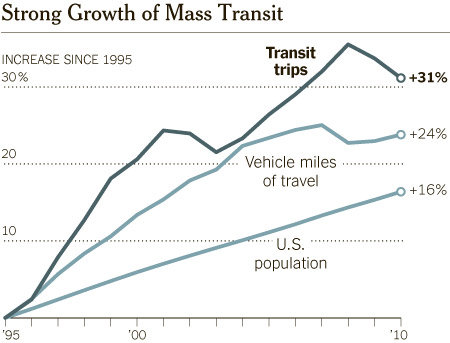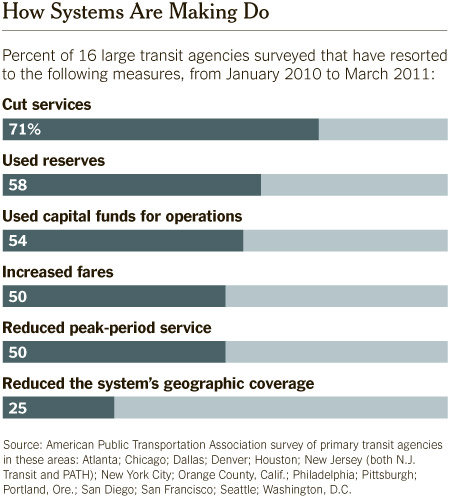December 31, 2011 New York Times
The Recession Squeeze On Buses and Trains
By Eleanor Randolph
For the average American driver, the time wasted in traffic jams has more than doubled in 30 years. The best way of easing that gridlock — not to mention saving gas, curbing pollution and finally finishing that novel — is public transit.
Yet, as more Americans are sensibly leaving their cars at home and opting for the bus or train, mass transit is in deep financial trouble. “We are going over the cliff,” Elliot Sander, chairman of the Regional Plan Association, said recently. “We will be back where we were in the 1970s and 1980s, where the older systems across the country are literally falling apart.”
That alarm is not an idle one. But it comes with one piece of good news: the number of trips taken annually on public transit is now more than 10 billion and rising, compared with 7.8 billion trips in 1995, outstripping population growth and the number of miles traveled on streets and highways.
Ridership, which dipped during the recession in 2009, is rising again as more baby boomer retirees take buses and high gas prices push more people to try the thriftier option. Even some cities in areas dominated by cars — like Dallas and Salt Lake City — have expanded their public transit systems.
The problem is, financing for mass transit has not kept pace as cash-strapped state and local governments limit their support. The federal government, which provides only about 17 percent of financing for transit systems, should be doing a lot more, particularly since nearly 60 percent of rides are related to work, with commuters from every income level.
Of the 18.4 cents per gallon federal gas tax, only 2.86 cents goes to public transit and almost all of the rest is reserved for highways. Although Congress has increased transit support in recent years, it is still too stingy to maintain stable services in many areas. The Federal Transit Administration has estimated that to bring all of the nation’s networks up to good repair — not expanding them, but mostly fixing what’s already there — would take more than $78 billion.
Meanwhile, systems are relying more on fares or state and local money. Many have had to cut back services, increase fares, raise local taxes, lay off workers, borrow to meet operating costs and put off replacing old vehicles. The chart above shows how 16 large transit agencies coped with dwindling resources.
In Chicago, the Transit Authority has seen a huge drop in local funding, largely derived from sales taxes that plunged with the recession. Transit officials borrowed more than $550 million in a four-year period starting in 2008 to pay day-to-day expenses — a desperate and costly move. And even with fare increases, in 2010 bus service was cut 18 percent and rail service 9 percent.
In Atlanta, Beverly Scott, general manager of the Metropolitan Atlanta Rapid Transit Authority, said that her agency faced “massive, draconian, horrifying” budget gaps in 2009. It consolidated bus routes and cut train service. That means more crowding and longer waits, even with higher fares. InBoston ridership is up, but so is debt; last year, virtually every dollar paid by riders went to debt service. The Metropolitan Transportation Authority in New York, by far the nation’s biggest, managed to balance its budget, but has also cut services and raised fares for three years.
The budget pain comes at a time when more people are finally realizing that public transit is a better deal than driving. The question is how we turn that into a broader cultural shift.
The president of the American Public Transportation Association, Michael Melaniphy, predicts that more commuters will reach a choking point and say: “I can’t sit in this car any longer and waste any more time.” On a bus, you can text friends legally. On a train, you can keep your eyes on a Kindle. As riders leave their cars, Congress should reward all of us by financing first-rate public transportation that saves gas, tempers, time and the environment.



